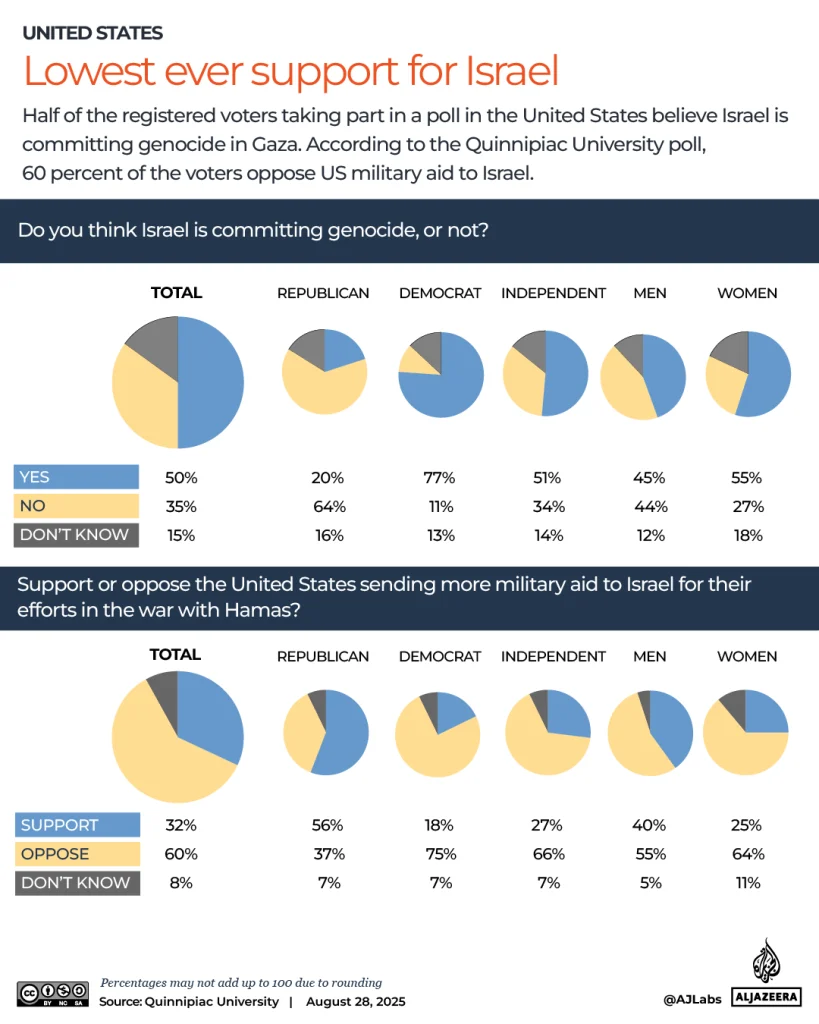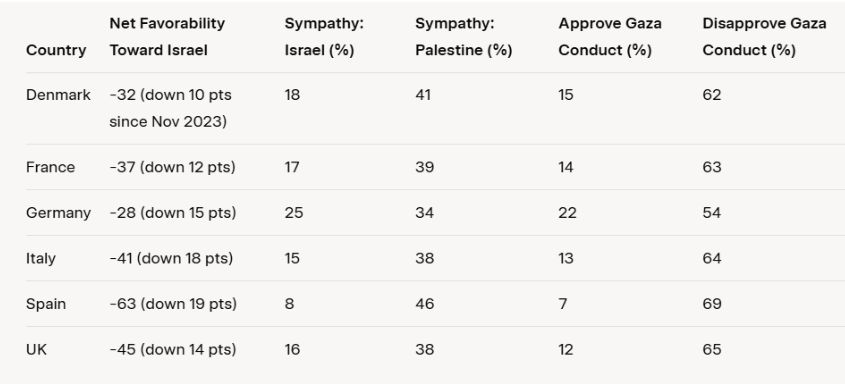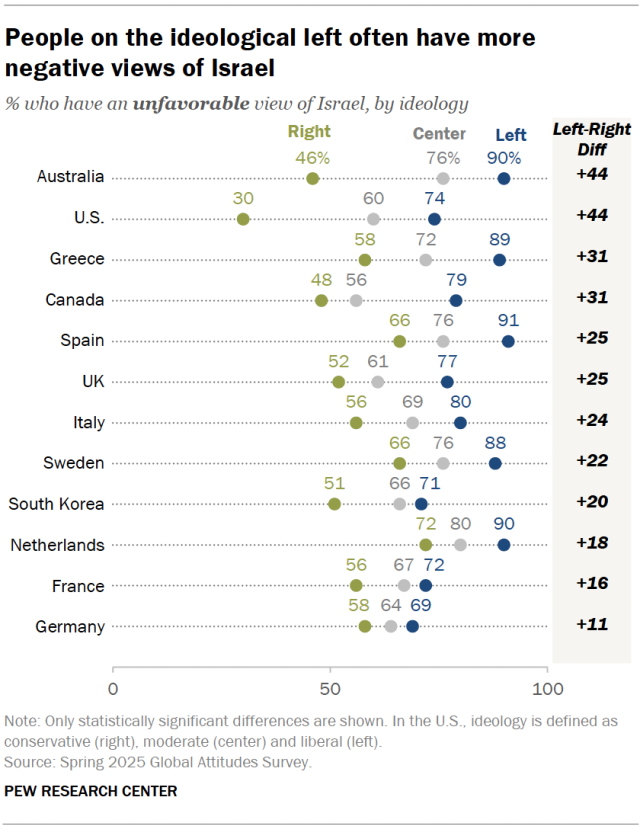Global Opinion about Palestine and particularly about Gaza
USA (September 2025)
The most recent comprehensive study on US public opinion regarding the Israel genocide in Gaza (often framed in the context of Israel-Palestine dynamics) is the Harvard CAPS/Harris Poll, conducted online from August 20-21, 2025, among 2,025 registered voters.
This poll, released on August 27, 2025, highlights a stark generational divide, with younger Americans—particularly Generation Z (aged 18-24)—showing significantly more sympathy toward Hamas compared to older cohorts and the general population.
Key Findings on Support in the Israel and Palestine:
1. Approval of Conduct in the genocide:
Israel genocide: Overall 49% approve, 51% disapprove. For Gen Z: 29% approve, 71% disapprove.
Sources: https://harvardharrispoll.com/wp-content/uploads/2025/08/HHP_Aug2025_KeyResults.pdf
2. Generational Breakdown: Gen Z’s Preference for Hamas:
Gen Z stands out as the only age group where a majority favors not only for Palestine, but with majority favors for Hamas over Israel. The table below summarizes support levels by age group: 60% support for Hamas among 18-24-year-olds.
Sources: https://nypost.com/2025/08/30/world-news/60-of-gen-z-in-us-support-hamas-over-israel-poll/
3. Six in 10 US voters also oppose Washington sending more military aid to Israel, according to a Quinnipiac poll.
4. Half of voters in the United States believe Israel is committing genocide in Gaza, a poll has found.

Europe (September 2025)
A comprehensive multi-country study highlighting the sharp decline in support for Israel amid the ongoing genocide in Gaza is the YouGov EuroTrack survey, released on June 3, 2025. Conducted online from May 28 to June 5, 2025, among approximately 1,000 adults in each of six Western European nations (Denmark, France, Germany, Italy, Spain, and the UK), it captures widespread disapproval of Israel genocide in Gaza and records the lowest-ever net favorability ratings for Israel since tracking began in 2013.
The poll attributes much of the erosion in support to perceptions of excessive force and humanitarian crises in Gaza, with sympathy tilting heavily toward Palestinians.
Key Overall Findings
- Declining Favorability and Sympathy Shift: Net favorability toward Israel hit historic lows across all countries, down significantly since November 2023 (e.g., -19 points in Spain, -18 in Italy). In every nation, more respondents sympathize with Palestinians than Israelis, reflecting a broader European trend of eroding support for Israel linked to the Gaza war’s death toll (over 40,000 reported by mid-2025) and allegations of disproportionate response.
- Disapproval of the genocide in Gaza: Only 6-16% approve of Israel’s actions in Gaza, with majorities (54-69%) disapproving—figures that have worsened since early 2024 polls. While the survey doesn’t use the term “genocide,” the high disapproval correlates with growing public calls for ceasefires and aid, amid UN and NGO reports labeling aspects of the campaign as potential war crimes.
- Broader Implications: 70-80% in most countries support a two-state solution, but trust in Israel’s commitment has plummeted, with many viewing the Gaza offensive as undermining peace prospects.
Country-Specific Breakdowns
The table below summarizes net favorability, sympathy levels, and approval of Israel’s Gaza genocide. These reveal the steepest drops in traditionally pro-Israel nations like Germany and the UK.
Sources:
https://yougov.co.uk/topics/politics/explore/issue/Israel_Palestine_Conflict


Middle Est (September 2025)
Revival of the Palestinian Cause in the Middle East Amid the genocide in Gaza
The Palestinian cause had largely faded from the forefront of Middle Eastern politics in the years leading up to October 2023, overshadowed by Arab-Israeli normalization deals like the Abraham Accords, which prioritized economic ties, security cooperation against Iran, and pragmatic diplomacy over the unresolved Israeli-Palestinian conflict.
Countries such as the UAE, Bahrain, Morocco, and Sudan normalized relations with Israel, while even Saudi Arabia advanced talks, sidelining demands for Palestinian statehood. However, the October 7, 2023 event, and Israel genocide in Gaza dramatically reversed this trend. The genocide has thrust the issue back onto regional agendas through a combination of grassroots outrage, diplomatic recalibrations, and the resurgence of anti-Israel alliances.
Surge in Grassroots Support and Public Outrage
One of the most visible ways the genocide in Gaza revived the Palestinian cause was through unprecedented public mobilization across the Arab world, reigniting a sense of pan-Arab solidarity that had waned since the Arab Spring. In countries like Jordan, Egypt, Morocco, and Bahrain—states with peace treaties or normalization pacts with Israel—tens of thousands took to the streets in protests, sit-ins, and rallies.
For instance, Morocco saw over 5,000 such events in the past year alone, while Bahrain witnessed rare demonstrations in Manama demanding an end to ties with Israel. Slogans like “Normalization is treason” echoed from Amman to Cairo, reflecting a “new generation” of activists using social media to amplify boycott campaigns against pro-Israel companies; in Egypt, apps tracking boycott lists garnered over a million downloads.
Diplomatic and Governmental Shifts
Governments, while more restrained, have faced mounting pressure that has stalled normalization and elevated Palestinian demands in official rhetoric. Saudi Arabia, once poised for a landmark deal, explicitly conditioned any ties on Israeli recognition of a Palestinian state and an end to the genocide in Gaza. Broader Arab states, including those in the Abraham Accords, have not severed relations—citing security benefits and fears of domestic unrest akin to 2011—but have allowed limited protests as a “safety valve” while suppressing larger ones to avoid broader upheaval over economic woes. Jordan’s Foreign Minister, for example, questioned scrapping its peace treaty, arguing it wouldn’t aid Palestinians, yet public fury has forced rhetorical pivots toward two-state solutions.
Asia (September 2025)
Massive Street Protests and Public Mobilization
Israel genocide in Gaza scale has sparked unprecedented demonstrations in Asia, often dwarfing prior Palestinian solidarity events. In Southeast Asia’s Muslim-majority nations, turnout has been staggering:
- In November 2023, hundreds of thousands rallied in Jakarta, Indonesia, near the U.S. embassy, demanding an end to the blockade and U.S. support for Israel.
- Similar scenes unfolded in Kuala Lumpur, Malaysia, where Prime Minister Anwar Ibrahim personally joined protesters in late 2023, chanting against Western “double standards” and linking the conflict to broader anti-imperialist sentiments.
- By August 2025, tens of thousands marched in Malaysia again as part of global actions, waving Palestinian flags and calling for boycotts. In Bangladesh and Pakistan, economic hardships intertwined with religious fervor, leading to rallies in Dhaka and Karachi that blended Gaza solidarity with anti-Israel chants, sometimes veering into anti-Semitic rhetoric amid radicalization fears.
South Asia saw a surge too, despite varying state stances. In India, which initially affirmed “solidarity” with Israel in October 2023, pro-Palestinian protests erupted in cities like Delhi and Kolkata, drawing students and Muslim communities despite crackdowns in sensitive areas like Kashmir. These highlighted a growing divide between government pro-Israel ties (e.g., arms deals) and public opinion in favor for Palestine. Even in non-Muslim-majority spots like Sri Lanka and Nepal, 2025 saw smaller but vocal demos, with protesters linking Gaza to local fights against oppression.
East Asia, historically more restrained due to U.S. alliances, witnessed rarer but symbolic actions. In Japan, activists in December 2024 painted “tears” on walls to symbolize each Palestinian killed, while August 2025 rallies in Tokyo demanded sanctions. South Korea hosted “K-protests” in 2025, with youth groups decrying the war as a “genocide,” though numbers were smaller than in the south. Thailand and Vietnam saw quieter vigils, like Thai fans welcoming a Palestinian visitor in September 2025 with messages of condolence.
Diplomatic Shifts and Policy Pressures
Asian governments, once sidelined on Palestine, have faced domestic pressure to act, leading to bolder stances. Indonesia, the world’s largest Muslim nation, condemned Israel’s “occupation” at the UN, provided aid like a Gaza hospital, and in September 2025 endorsed a joint flotilla with Pakistan and Turkey to break the blockade.
Malaysia banned Israeli ships in 2023 and reaffirmed “solidarity” in joint statements with Pakistan at the 2025 Arab-Islamic Summit prep in Doha, urging Muslim unity.
Bangladesh and Pakistan consistently backed Palestine in OIC forums, with Pakistan sending aid packages of tents and medicines in October 2023.
Even pro-Israel states like India softened: After initial backing, it voted for a UN humanitarian truce in December 2023, balancing ties with Israel (e.g., via the I2U2 group) against Muslim voter concerns.
China advocated a “two-state solution” from the outset, while Japan and South Korea emphasized Israel’s “self-defense” but ramped up Gaza aid to avoid alienating Muslim trade partners.
Brunei and the Maldives joined recognitions of the war as “genocide” by mid-2025, amplifying calls for ICC action.










